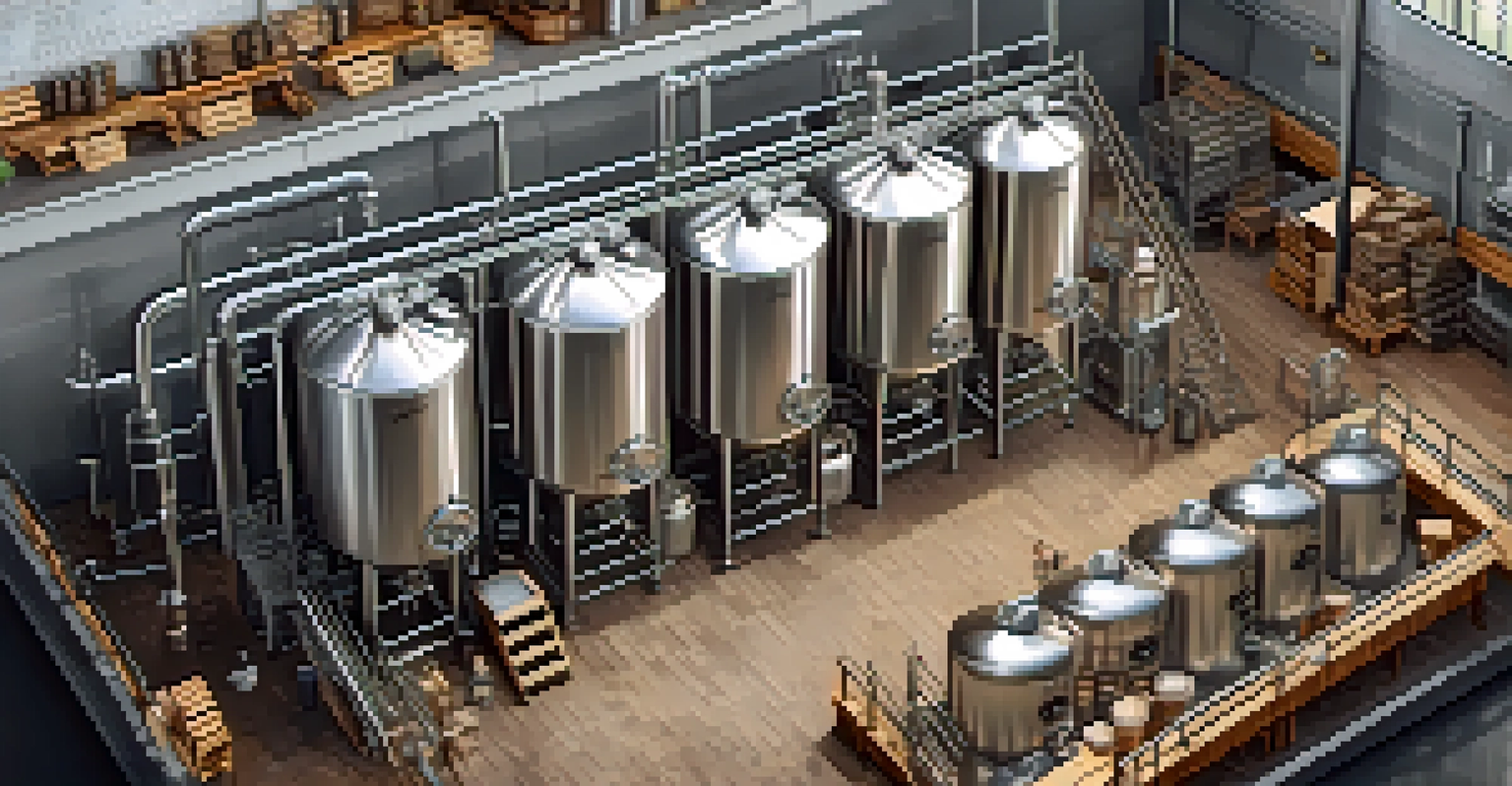Sustainable Practices in Colorado's Craft Brewing Industry

The Rise of Craft Brewing in Colorado
Colorado has become a hotbed for craft brewing, with hundreds of breweries dotting the landscape. This surge reflects not just a passion for unique flavors, but also a growing awareness of environmental responsibility. Breweries are increasingly recognizing their role in the community and the planet, leading to innovative ways to brew sustainably.
Sustainability isn't just a trend; it's becoming an essential part of a brewery's identity.
Many Colorado breweries have adopted practices that minimize waste and reduce their carbon footprint. For instance, breweries like New Belgium have been pioneers in integrating eco-friendly initiatives into their brewing processes. The state's culture of outdoor adventure and appreciation for nature fuels this commitment to sustainability.
This passion for craft and the environment has created a vibrant brewing community. The collaboration among breweries to share best practices and resources is a testament to their dedication to sustainability, making Colorado a leader in responsible craft brewing.
Water Conservation Efforts in Brewing
Water is a critical ingredient in brewing, and Colorado's breweries are stepping up to conserve this precious resource. Many breweries implement advanced water-saving technologies, such as closed-loop systems that recycle water used during production. This not only conserves water but also reduces the overall operational costs.

For example, Odell Brewing Company has made significant strides in water efficiency by monitoring usage meticulously and optimizing their processes. This proactive approach not only helps the environment but also showcases their commitment to responsible brewing practices. By using less water, breweries can allocate more resources to creativity and quality.
Sustainable Brewing Practices Thrive
Colorado's craft breweries are leading the way in sustainable brewing through innovative practices that minimize waste and reduce environmental impact.
Moreover, the community benefits from these efforts as well. Reduced water consumption leads to a lower environmental impact, which is essential in a state that often faces drought conditions. Breweries that prioritize water conservation set a great example for other industries to follow.
Energy Efficiency in Craft Brewing
Energy consumption is another critical area where Colorado's craft breweries are making impactful changes. Many are investing in energy-efficient equipment and renewable energy sources, such as solar panels, to power their operations. This not only reduces their carbon footprint but also supports the local economy by utilizing Colorado's abundant renewable resources.
The best way to predict the future is to create it.
Take the example of the Boulder Beer Company, which has implemented energy-efficient brewing systems that significantly lower energy usage. They have also adopted practices such as LED lighting and energy audits to continuously improve their energy efficiency. These initiatives reflect a broader trend in the industry toward sustainable practices that benefit both the brewery and the environment.
By prioritizing energy efficiency, breweries can reduce operational costs while demonstrating their commitment to sustainability. This approach not only resonates with eco-conscious consumers but also positions these breweries as leaders in the industry.
Waste Reduction Initiatives
Waste reduction is a key focus for many craft breweries in Colorado, where the emphasis is on reducing, reusing, and recycling. Breweries are finding innovative ways to repurpose spent grains, which can be used as animal feed or for creating unique food products. This practice not only minimizes waste but also supports local agriculture.
A notable example is the Dry Dock Brewing Company, which has partnered with local farmers to ensure their spent grains are put to good use. By collaborating with the agricultural community, they create a circular economy that benefits everyone involved. This approach not only demonstrates their commitment to sustainability but also strengthens community ties.
Water and Energy Conservation Focus
Breweries in Colorado are implementing advanced technologies to conserve water and energy, showcasing their commitment to responsible resource management.
Furthermore, many breweries are implementing comprehensive recycling programs to manage their waste effectively. By reducing landfill contributions, these breweries are actively participating in a larger movement toward environmental responsibility, setting a standard for others in the industry.
Sourcing Local Ingredients
Sourcing local ingredients has become a hallmark of Colorado's craft brewing culture. Breweries are increasingly prioritizing local hops, grains, and other ingredients, which not only supports local farmers but also reduces transportation emissions. This practice creates a more sustainable supply chain and promotes the regional economy.
For instance, the Left Hand Brewing Company emphasizes the importance of local sourcing in their brewing process. By collaborating with local farmers and suppliers, they not only secure fresh ingredients but also reduce their carbon footprint. This commitment to local sourcing embodies the spirit of community that is central to Colorado's craft brewing scene.
Moreover, using local ingredients often results in unique flavors that reflect the terroir of Colorado. This not only enhances the beer's quality but also creates a deeper connection between the brewery and its community, making every sip a celebration of local culture and sustainability.
Community Engagement and Education
Community engagement plays a significant role in the sustainable practices of Colorado's craft breweries. Many breweries host events, workshops, and tours to educate the public about sustainability in brewing. These initiatives not only raise awareness but also inspire other businesses and consumers to adopt eco-friendly practices.
For example, the Great American Beer Festival often includes educational sessions focused on sustainability in the brewing industry. These discussions allow brewers to share their experiences and knowledge, creating a collaborative atmosphere that fosters innovation. By engaging with the community, breweries can amplify their impact on sustainability.
Community Engagement Drives Change
Local breweries actively engage with their communities to educate and promote sustainability, reinforcing their role as environmental stewards.
Furthermore, breweries are also giving back by participating in local conservation efforts and partnering with environmental organizations. This commitment to community involvement reinforces the connection between breweries and their local environment, highlighting the importance of sustainability beyond just brewing.
The Future of Sustainable Brewing in Colorado
As awareness of environmental issues continues to grow, the craft brewing industry in Colorado is poised to lead the charge in sustainable practices. The commitment to eco-friendly brewing methods is not just a trend; it's becoming an essential part of a brewery's identity. This shift is likely to inspire other industries to adopt similar practices.
With advancements in technology and a focus on resource conservation, the future of sustainable brewing looks promising. Breweries are experimenting with new methods and ideas to further reduce their environmental impact. This innovative spirit is what drives Colorado's craft brewing industry to continuously improve and evolve.

Ultimately, the future of sustainable brewing in Colorado will depend on collaboration and education. As breweries continue to work together and share their successes, they will inspire a new generation of brewers committed to sustainability, ensuring that the craft brewing scene remains vibrant and environmentally friendly for years to come.